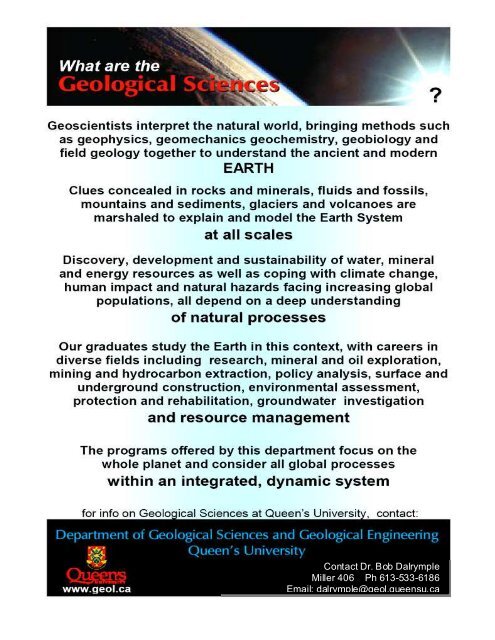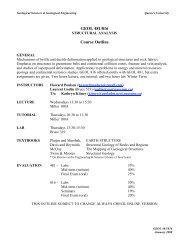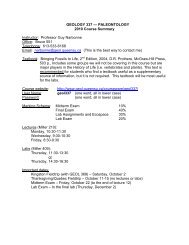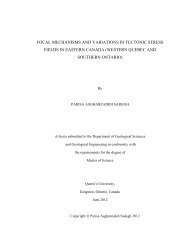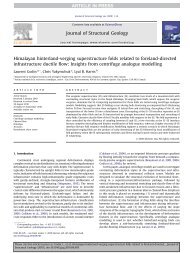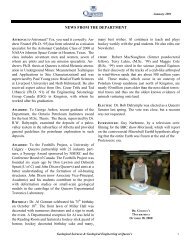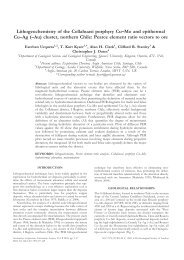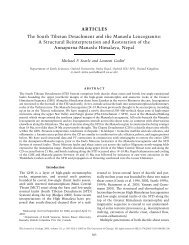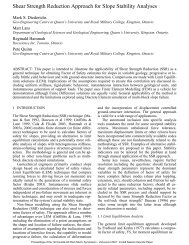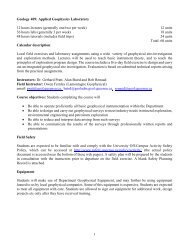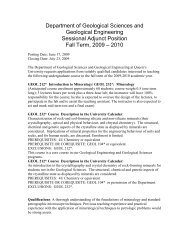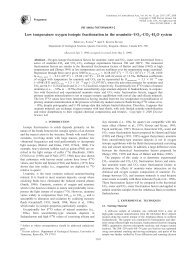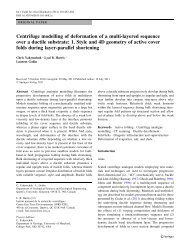Geosciences Program Brochure - Queen's University
Geosciences Program Brochure - Queen's University
Geosciences Program Brochure - Queen's University
Create successful ePaper yourself
Turn your PDF publications into a flip-book with our unique Google optimized e-Paper software.
Contact Dr. Bob Dalrymple<br />
Miller 406 Ph 613-533-6186<br />
Email: dalrymple@geol.queensu.ca
More information on the Department (including engineering programs and graduate research opportunities)<br />
is available at:<br />
www.geol.queensu.ca<br />
Choosing the Appropriate Geology <strong>Program</strong><br />
Students wishing to complete a degree program designed to train specialists in the Geological Sciences<br />
are encouraged to select one of the following two 4-year Honours degrees in Geology:<br />
• B.Sc. (Honours) Major concentration is ideal for students who are interested in a career-oriented<br />
program in the geosciences that also allows a wide choice of supporting and elective courses.<br />
• B.Sc. (Honours, Geological Sciences) Subject of Specialization (SSP) program provides the<br />
opportunity for intensive study of Geology and the supporting sciences. This program is designed to lead<br />
easily to registration as a Professional Geoscientist.<br />
Students wishing to take a concentration in another discipline beside geology, but who still have a keen<br />
interest in learning more about the planet on which they live, may want to consider one of the following<br />
4-year Honours programs (Geology Minor):<br />
• B.A. (Honours) Major-Minor concentration (Geology forms the minor component of the degree<br />
program) allows a student whose primary interest is in the Humanities or Social Sciences to take a small<br />
group of fundamental geology courses. The Geology Minor degree requirements are combined with a Major<br />
in a Humanities or Social Science discipline to form a Major-Minor degree. The B.A. (Honours) Major-<br />
General concentration is similar, but here the Geology General degree requirements are combined with a<br />
Major in a Humanities or Social Science discipline to form a degree which has a somewhat larger Geology<br />
component.<br />
• B.Sc. (Honours) Major-Minor concentration (Geology forms the minor component of the degree<br />
program) allows a student with a strong interest in another of the sciences to take a small group of<br />
fundamental geology courses. The Geology Minor degree requirements are combined with a Major in<br />
another science discipline to form a Major-Minor degree. The B.Sc. (Honours) Major-General<br />
concentration is similar, but here the Geology General degree requirements are combined with a Major in<br />
another science discipline to form a degree which has a somewhat larger Geology component.<br />
• B.Sc. (Honours, Environmental Geology) Subject of Specialization (SSP) program is offered by<br />
the School of Environmental Studies and provides a broad exposure to environmental issues while focusing<br />
on environmental aspects of the earth sciences.<br />
The Geology Department also offers the following three-year degree programs:<br />
• B.Sc. (General) concentration provides a solid introduction to the Geological Sciences in a threeyear<br />
degree that allows the student considerable flexibility in the selection of elective courses. The<br />
concentration requirements can also be combined with a Major degree in another discipline to form a Major-<br />
General degree (see above).<br />
• B.A. (Minor) concentration provides access to a small group of fundamental geology courses and<br />
permits the student considerable flexibility in the selection of electives. The concentration requirements can<br />
also be combined with a Major degree in another discipline to form a Major-Minor degree (see above).<br />
For general information about these various types of program, please visit:<br />
http://www.queensu.ca/calendars/artsci/Geological_Sciences_Degree_<strong>Program</strong>s.html
A NOTE ABOUT FIRST YEAR COURSES IN GEOLOGY<br />
This brochure is for information only. The official calendar text takes precedence.<br />
Our First Year Offerings:<br />
GEOL-104*/0.5 The Dynamic Earth [3 hours lectures, 2 hours lab each week]<br />
An introduction to the internal structure of the earth and to the dynamic processes which have shaped the earth’s<br />
surface. An integrated study of global tectonics and continental movement, rock genesis, mountain building,<br />
resource occurrence, glaciation and geological time. Laboratories give an overview of the earth scientist’s toolbox<br />
including rock and mineral identification, geochronology, geomorphology and structural geology. A field trip to<br />
local exposures may be offered. GEOL 104* is required for entrance into any program of study in Geology.<br />
NOTE: Lab manual and materials cost about $20. Course offered in both the fall and winter terms. EXCLUSION:<br />
APSC 151.<br />
GEOL-106*/0.5 Environmental Geology and Natural Hazards [3 hours lectures each week]<br />
The relationship between human-kind and our ever-changing planet, with a focus on natural geologic hazards<br />
(volcanic eruptions, earthquakes, landslides, tsunamis, mass movement, floods, extraterrestrial impacts, etc.), and<br />
environmental impacts which result from population and land-use expansion and our increased use of water,<br />
energy and mineral resources. A study of the sources and impacts of pollution and global climate change. Public<br />
perception of and response to geological risk.<br />
GEOL-107*/0.5 History of Life [3 hours lectures each week, plus four 3-hour labs]<br />
The history of life, from its inception four billion years ago to the present day, focusing on the inter-relationship<br />
between organic evolution and global change. Co-evolution of early life and the atmosphere; development of<br />
marine animals and their ecosystems; invasion of the land; dinosaurs and their world; mass extinctions; the Age of<br />
Mammals; and hominid evolution. GEOL 107* is a required course in all Geology programs.<br />
NOTE 1: Of the above courses, only GEOL 104* and GEOL 107* are components of the Geology Core, and<br />
at least one of these is normally taken in first year. However, either GEOL 106* or GEOL 107* alone may be<br />
sufficient for entrance into 2nd year ONLY IF GEOL 104* is then taken immediately in 1st term of 2nd year<br />
and GEOL 107* (if not previously completed) is taken at some time during the program.<br />
If possible, it is preferable to take GEOL 104* in first year (offered in the fall and again in winter).
GEOLOGY DEGREE PROGRAMS<br />
The following pages provide detailed descriptions of the content of each of the several degree programs that<br />
can be followed in Geology. The material presented below has been taken from the Arts and Science<br />
Calendar. Because the precise specification of the various programs changes from time to time, please note<br />
that the Calendar contains the official description of what is required in each program type. This information<br />
can be found at:<br />
http://www.queensu.ca/calendars/artsci/Geological_Sciences_Degree_<strong>Program</strong>s.html<br />
Both the Major and Subject of Specialization (SSP) degrees in Geological Science (Arts and Science) at<br />
<strong>Queen's</strong> <strong>University</strong> require students to take the Geology Core (the courses listed below), plus additional<br />
specified courses. All degrees also contain additional electives that are freely chosen by the student.<br />
THE GEOLOGY CORE (5.5 full course credits)<br />
- GEOL-104* The Dynamic Earth<br />
- GEOL-107* History of Life<br />
- GEOL-200* Oceanography<br />
- GEOL-221* Geological Field Methods<br />
- GEOL-232* Introduction to Mineralogy<br />
- GEOL-235* Genesis and Characterization of Solid Earth Materials<br />
- GEOL-238* Surficial Processes, Sedimentation and Stratigraphy<br />
- GEOL-249* Geophysical Characterization of the Earth<br />
- GEOL-300* Geological Field School<br />
- GEOL 321* Analysis of Rock Structures<br />
- GEOL 365* Geochemical Characterization of Earth Processes<br />
ADDITIONAL SPECIFIED COURSES<br />
1) A first-year course in calculus (normally MATH 121) is required in all programs except the Minor.<br />
2) A first-year course in chemistry (CHEM-112 or CHEM-116) and physics (PHYS-104 or PHYS-106 or<br />
PHYS-107) is required in all programs except the General program, where only one of these two<br />
courses must be taken (see notes for specific programs).<br />
ELECTIVES<br />
1) You will require some number of freely chosen GEOL courses (the number required depends on your<br />
program). In the SSP degree, you also must take 1.0 credit in other specified departments<br />
(see more below).<br />
2) Your remaining courses are free electives (any department, provided prerequisites have been fulfilled).
BSCH-SSP Bachelor of Science (Honours, Geological Sciences) -BSCH Subject of<br />
specialization –SSP [16 specified credits and 4 elective credits]<br />
- a first-year credit in Chemistry (CHEM 112 or CHEM 116)<br />
- a first-year credit in Mathematics (calculus; MATH 121 or equivalent)<br />
- a first-year credit in either Biology or Mathematics(linear algebra)<br />
- a first-year credit in Physics (PHYS 104 or PHY 106 or PHYS 107)<br />
- the Geology Core <strong>Program</strong> (5.5 credits; see above)<br />
- GEOL 337* Paleontology<br />
- one half-course selected from GEOL 323*, 333* or 478*<br />
- one half-course selected from GEOL 323*, 333*, 362*, 368*, 421* or 478*<br />
- GEOL 488* Geology of North America<br />
- GEOL 543 Research and Thesis<br />
- STAT 263* Introduction to Statistics<br />
- 2.0 additional credits in Geology<br />
- 1.0 credits selected from the sciences, Mathematics or WRIT 175* (NOTE: These science and Mathematics<br />
courses should be at the 200-level or above. Some Geography courses are considered to be science<br />
courses: these include all courses in the categories of Physical Geography or Techniques and Research<br />
Methods (see listings in the Geography section of the Calendar). The only exceptions to the 200-level rule<br />
are CISC 101* and CISC 124*.)<br />
- 4.0 elective credits<br />
NOTE: This degree is our most rigorously prescribed degree program.<br />
It is intended to lead to a career in the geological sciences, or to further education at the graduate level.<br />
The courses specified in this degree (exclusive of the 4.0 elective credits) are intended to permit easy<br />
registration as a “Professional Geoscientist” with the Association of Professional Geoscientists of Ontario<br />
(APGO). However, acceptance of courses as fulfilling the APGO “Knowledge Requirements” is at the sole<br />
discretion of the APGO. Interested students should visit the APGO registration site at<br />
http://www.apgo.net/register-how.htm.
BSCH-MAJ Bachelor of Science (Honours, Geological Sciences)-BSCH Major–MAJ<br />
[12.0 specified credits; 8.0 elective credits]<br />
- a first-year credit in Chemistry (CHEM 112 or CHEM 116)<br />
- a first-year credit in Mathematics (calculus; MATH 121 or equivalent)<br />
- a first-year credit in Physics (PHYS 104 or PHYS 106 or PHYS 107)<br />
- the Geology Core <strong>Program</strong> (5.5 credits; see above)<br />
- GEOL 488* Geology of North America<br />
- STAT 263* Introduction to Statistics<br />
- 2.5 additional credits in Geology<br />
- 8.0 elective credits<br />
NOTE: This degree is less rigorously prescribed than the Subject of Specialization (SSP) degree program<br />
described above. However, it is also intended to lead to a career in the Geological Sciences. Students who<br />
complete this degree program can also go on to graduate studies, but should elect to take additional geology<br />
courses as “electives”. While this degree program does not lead to automatic fulfillment of the APGO<br />
“Knowledge Requirements” (the basis for registration as a Professional Geoscientist), students taking the<br />
Major degree can still meet those Knowledge Requirements by a judicious selection of elective courses.<br />
Interested students should visit the APGO registration site at http://www.apgo.net/register-how.htm.
The General <strong>Program</strong> [8.0 specified credits]<br />
- MATH121<br />
- a first-year course in Chemistry (CHEM 112 or CHEM 116)<br />
OR Physics (PHYS 106 or PHYS 107)<br />
- GEOL 104* The Dynamic Earth<br />
- GEOL 107* History of Life<br />
- GEOL 200* Oceanography<br />
- GEOL 221* Geological Field Methods<br />
- GEOL 232* Introduction to Mineralogy<br />
- GEOL 235* Genesis and Characterization of Solid Earth Materials<br />
- GEOL 238* Surficial Processes, Sedimentation and Stratigraphy<br />
- GEOL 249* Geophysical Characterization of the Earth<br />
OR GEOL 365* Geochemical Characterization of Earth Processes<br />
- GEOL 300* Geological Field School<br />
- GEOL 321* Analysis of Rock Structures<br />
- 1.0 additional credits in Geology<br />
NOTE: This degree specification can be used in three different degree programs:<br />
1) As a stand-alone 3-year B.Sc. degree. To obtain this degree, the student must add 7.0 elective credits.<br />
Such a degree is not intended as preparation for a career in the geological sciences.<br />
2) Combined with a Major degree program in a humanities or social science discipline, to produce a<br />
Bachelor of Arts (Honours) Major-General degree. In this pattern, the additional 11.0 credits will largely<br />
be specified by the Major program, although there may be a small number of elective credits.<br />
3) Combined with a Major degree program in another science discipline, to produce a B.Sc. (Honours)<br />
Major-General degree. In this pattern, the additional 12.0 credits will largely be specified by the Major<br />
program, although there may be a small number of elective credits.<br />
No degree that contains the General Geology program is intended as preparation for a professional career<br />
as a geological scientist.
The Minor <strong>Program</strong> [6.0 specified credits]<br />
- 1.0 credits in any of Biology, Chemistry, Computing, Mathematics or Physics<br />
- GEOL 104* The Dynamic Earth<br />
- GEOL 107* History of Life<br />
-4.0 additional credits in Geology<br />
NOTE: This degree specification can be used in three different degree programs:<br />
1) As a stand-alone 3-year Bachelor of Arts degree. To obtain this degree, the student must add 9.0<br />
elective credits.<br />
2) Combined with a Major degree program in a humanities or social science discipline, to produce a<br />
Bachelor of Arts (Honours) Major-Minor degree. In this pattern, the additional 13.0 credits will largely<br />
be specified by the Major program, although there may be a small number of elective credits.<br />
3) Combined with a Major degree program in another science discipline, to produce a Bachelor of<br />
Science (Honours) Major-Minor degree. In this pattern, the additional 14.0 credits will largely be<br />
specified by the Major program, although there may be a small number of elective credits.<br />
No degree that contains the Geology Minor is intended as preparation for a career as a geological scientist.<br />
This description is intended as a guide. See<br />
http://www.queensu.ca/calendars/artsci/Bachelor_of_Arts___BA_12.html<br />
for the official calendar description of the Geology Minor. For more general information about the various<br />
degree programs that might involve the Geology Minor, please follow the various links at<br />
http://www.queensu.ca/calendars/artsci/Academic_<strong>Program</strong>s.html.


